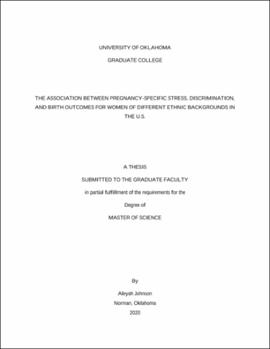| dc.contributor.advisor | Dobbs, Page | |
| dc.contributor.author | Johnson, Aleyah | |
| dc.date.accessioned | 2020-05-11T18:14:44Z | |
| dc.date.available | 2020-05-11T18:14:44Z | |
| dc.date.issued | 2020-05-08 | |
| dc.identifier.uri | https://hdl.handle.net/11244/324384 | |
| dc.description.abstract | Objective: The purpose of this study was to explore pregnancy-specific stress and experiences of discrimination as influences for disparities in birth outcomes for women of different racial/ethnic minority groups in the U.S.
Methods: Women between the ages of 18-45 were recruited online through social media and in-person to participate in the anonymous online survey. Complete responses were obtained from 198 women (101 no-Hispanic White, 58 Black, and 39 women that were grouped under other minority). The survey consisted of birth information, demographic questions, and 3 scales (the Prenatal Distress Questionnaire, the Prenatal Life Events Scale, and the General Ethnic Discrimination Scale), quantifying experiences of stress and discrimination during pregnancy. An analyses of variance was used to observe differences between the racial group’s experiences of stress and discrimination. A logistic regression was done to observe the influences of the scaled experiences on the occurrence of an adverse birth outcome.
Results: White and other minority women were found to have significantly higher distress during pregnancy. Black and other minority women reported experiencing more stressful prenatal life events and higher undesirable feelings towards them, although scores only differed significantly between White and other minority women. Black and other minority women also reported significantly more experiences of discrimination and were found to experience five times the stress from the encounters, when compared to white women. Pregnancy-specific stress was not found to be associated with adverse birth outcomes, however, when taking experiences of discrimination into consideration, racial neighborhood demographics, insurance type during pregnancy, and WIC utilization were found to significantly influence adverse birth outcomes, after controlling for birth and demographic factors.
Conclusions: Observing psychosocial aspects of the gestational experience for minority women in the U.S. may be helpful for understanding persistent disparities in birth outcomes. Targeting discriminatory and oppressive practices may also be necessary to include in interventions aiming to eliminate racial disparities for women’s reproductive health. | en_US |
| dc.language | en_US | en_US |
| dc.rights | Attribution-NonCommercial-NoDerivatives 4.0 International | * |
| dc.rights.uri | https://creativecommons.org/licenses/by-nc-nd/4.0/ | * |
| dc.subject | Disparities | en_US |
| dc.subject | Pregnancy | en_US |
| dc.subject | Discrimination | en_US |
| dc.subject | Stress | en_US |
| dc.subject.lcsh | Equality--Health aspects--United States | |
| dc.subject.lcsh | Pregnant women--United States | |
| dc.subject.lcsh | Pregnant women--Mental health--United States | |
| dc.subject.lcsh | Maternal and infant welfare--United States | |
| dc.subject.lcsh | Stress (Psychology) | |
| dc.title | The Association Between Pregnancy-Specific Stress, Discrimination, and Birth Outcomes for Women of Different Ethnic Backgrounds in the U.S. | en_US |
| dc.contributor.committeeMember | Maness, Sarah | |
| dc.contributor.committeeMember | Coleman, Lois | |
| dc.date.manuscript | 2020-04-29 | |
| dc.thesis.degree | Master of Science | en_US |
| ou.group | College of Arts and Sciences::Department of Health and Exercise Science | en_US |
| shareok.nativefileaccess | restricted | en_US |

